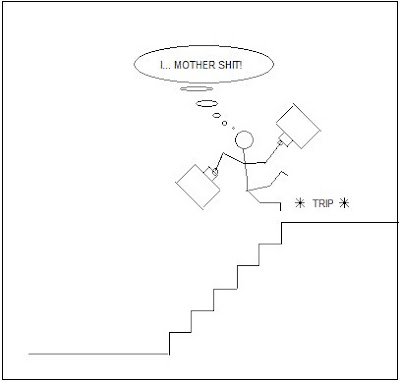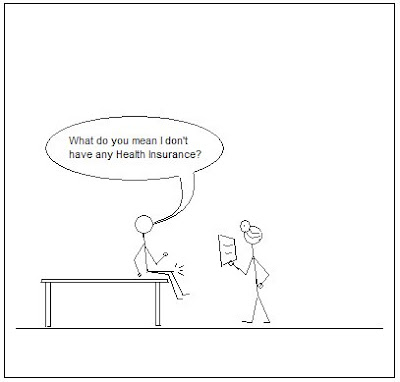Alright, the Set PA was a doll and allowed me to see her to do list for the ENTIRE WEEK. Whoopee! It doesn't include in and out times, but I might be able to add that later. But check it out. I have deleted any sensitive info but you should be able to get an idea of the tasks and added in my own notes where necessary.
MONDAY
-Unlock all doors
-Label dressing rooms (guest cast)
-Put scripts and start paperwork in guest cast rooms
-Turn on work lights and air conditioning
-Collect daily timesheets (Timesheets = recorded work hours for people)
-Stand-by for talent during production meeting (Prod. Meeting = Important peeps reading script)
-Pass out/collect new actor paperwork (All the guest cast needs to do contracts.)
-Place 2 vouchers in box for stand-ins (Random paperwork task)
-Re-read script during pre-read and table read (Table read = cast reads script)
-Highlight all SFX in script during pre-read and table-read.
-Distro call sheets for next day (Call sheet = who what where when list done each day)
-(Insert random paper task here)
-File callsheet for next day in bin and clipboard
-Check/Make sure to file: Script, Schedules, call sheets, Prod. Reports and voucher skins for the prior week.
-Turn off work lights
-Call office when last actor leaves
-Put ALL walkies back on charger
-Lock up
TUESDAY
-Unlock all doors and trailer rooms
-Label dressing rooms
-Put scripts and start paperwork in guest cast rooms
-Turn on work lights and air conditioning
-Collect daily timesheets
-Put hot bricks in podium (Hell if I know, sometimes you just need a brick)
-Distro script revision (Distro = Distribute. The SAT's would cry if they had tears.)
-Put 2-4 scripts and vouchers in stand-in box
-Pass out/collect new actor paperwork
-Eat breakfast while standing by outside for talent (HAHAHAHA. I find this funny.)
-Help Assistant Director coordinate wardrobe fittings (Note, you are not dressing them.)
-(Insert random paper task here)
-Put 6 chairs in front of each set for run-thru and 3 scripts in Network Executive room during rehearsal after lunch
-Turn air off for run-thru
-Distro call sheets for next day
-File callsheet for next day in bin and clipboard
-Paperclip Central Casting Sheets and return to gate on VanNess
-Turn off work lights
-Call office when last actor leaves
-Put ALL walkies back on charger
-Lock up
*Run power and play sound effects if necessary
WEDNESDAY
-Unlock all doors and trailer rooms
-Put scripts in new guest cast rooms
-Turn on work lights and air conditioning
-Collect daily timesheets
-Pin callsheets and schedule to 3 corkboards
-Put hot bricks in podium (Again with the bricks!)
-Put 2-4 scripts and vouchers in stand-in box
-Distro script revision
-Pass out/collect new actor paperwork
-Walk fire line onstage (Sometimes you just gotta live on the edge!)
-Turn air off for run-thru
-Turn red light switch in sound booth ON for run-thru
- Put 6 chairs in front of each set for run-thru and 3 scripts in Network Executive room during rehearsal after lunch
-Help Assistant Director coordinate wardrobe fittings
-Distro call sheets and Block & Shoots for next day
-Call office when last actor leaves
-Call necessary people with call time for crew on Thurs.
-File callsheet for next day in bin and clipboard
-Make sure timecards are stocked
-(Insert random paper task here)
-Turn off work lights
-Put ALL walkies back on charger
-Lock up
THURSDAY
-Unlock all doors and turn trailers on
-Turn on air conditioning
-Collect daily timesheets
-Pin callsheets and schedule to 3 corkboards
-Put hot bricks in podium (You think that thing would have caught fire by now. Maybe it is like a sauna. Lucky bastards!)
-Walk fire line onstage (This one is a risk runner)
-Put 4 scripts and vouchers in stand-in box
-Distro shooting scripts
-Put Block & Shoot schedule with scripts:
* On each podium and in make-up trailer
*In dressing rooms
*4 in Network Executive Booth
*4 in Stand-in box
-File call sheet and Block & Shoot schedule
-Distro callsheets for next day
-(Insert random paper task here)
-Proof read (Insert random paper task here)
-(Insert random paper task here)
-Call office when last actor leaves & you leave
-(Insert random paper task here)
-Get make-up timesheets from trailer when lock-up
-File call sheet for next day in bin and clipboard
-Turn off work lights
-Put ALL walkies back on charger
-Lock up
*Keep wrist bands on clipboard all day to distro to crew without badges
*Announce over walkie “today’s wristband colors”
*Take 3 schedules & call sheets to Sound Dept
FRIDAY
-Unlock all doors and turn trailers on
-Turn on air conditioning
-Collect daily timesheets
-Pin callsheets and schedule to 3 corkboards
-Put director chair out by trailers for security (We don't want no Directors wandering around all over the place now do we? Who knows what would happen!)
-Put Block & Shoot schedule:
* On each podium and in make-up trailer
*In dressing rooms
*4 in Network Executive Booth
*4 in Stand-in box
-Walk fire line onstage (You are lucky to be alive missy! This is the last time I call the fire dept. to save your reckless ass!)
-Make 3 copies of script
-Pass out daily timesheets for following week (or put in bin)
-Distro call sheets & scripts for next week
- Get daily script sheet from Person
-Tell dept. heads time for Prod. Mtg. on Monday
-Call office when last actor leaves & you leave
-File call sheet for next day in bin and clipboard
-File Block & Shoot schedule
-Paperclip Central Casting Sheets and return to gate
-Get make-up timesheets from trailer when lock-up
-Turn off work lights
-Put new names on dressing room doors
-Put ALL walkies back on charger
-Lock up
(And that is all folks! )






